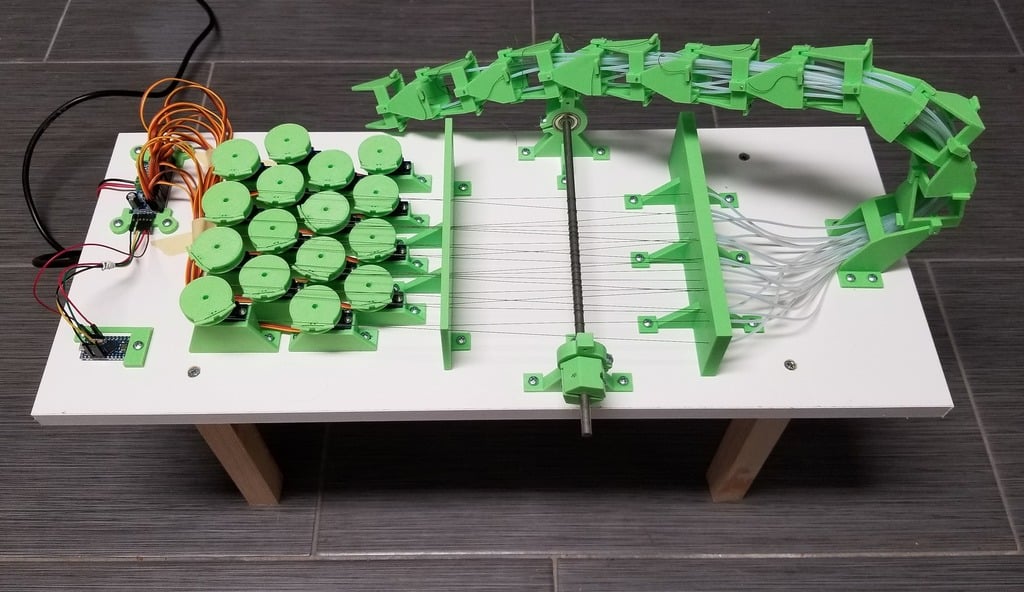
Dumbo 9000
thingiverse
This is a tentacle inspired by Richard 9000. Strictly speaking, this incarnation is not a derivative, rather it is more like a clone. Similarities: * It's a tentacle * Uses PTFE tube and fishing line * Uses 16-channel servo driver driven over I2C * Uses 16 servos to drive 16 degrees of freedom * Green in color * Ran out of PTFE tube partway through construction Differences: * Cables will be Dyneema fishing line for high strength, minimal stretch * Each joint is one degree of freedom instead of two, meaning 16 joints instead of 8 * Joints use metal pins as bearing element * Joints and pulleys have printed features for securing cables, which work quite well * Uses smaller, cheaper servos with tension amplified via capstan (not yet implemented) The purpose of this robot is as a proof-of-concept for driving many degrees of freedom with relatively strong force at low cost. If viable, the natural application would be a large-ish hexapod or perhaps biped. Hexapods and bipeds already exist with servos as joints, but the strength of servos limits the scale at which these are cost effective. If successful, the method from this experiment might allow larger versions at perhaps 5lbs weight and 3 feet in size. As of 09/16/2018, I've printed the and mounted 16 servo brackets (4 of each height) and assembled them onto a wooden platform (shelf from Home Depot). I've printed 15 knuckles and assembled them with nails. I purchased some hardened steel cutters to cut the nails into short segments for use as pins. Each knuckle is 35mm in length, axis to axis. As of 09/16/2018, I've not yet modeled or printed the capstan bearings, nor have I fully solved how I will drive the capstan. My current thought is to use a drill attached to the underside of the platform, using a belt to drive the capstan. I would prefer to minimize the number of special-order parts, but I think a belt will be more forgiving and much quieter than an equivalent gear. As of 09/16/2018, next steps are to build tentacle base and implement second "holey wall" that guides cords and holds ends of PTFE tubes. Also I need to build bearing blocks for supporting capstan, and build a mechanism to drive it. I'm currently thinking 1/4 inch metal rod for capstan and printed bushings/adapters for a good fit with inside diameter of 608 skate bearings. As of 09/21/2018, got servo driver working and rudimentary Arduino (using Pro Micro) moving all 16 motors. As of 09/21/2018, added second holey wall with countersunk holes for PTFE tube, anchor with joint for base of arm, and little brackets to hold the circuit boards. No capstan yet. Currently using a small PC power supply (attached to underside of table) to power servo driver. Arduino currently connected via USB but could be powered by PC power supply. As of 09/23/2018, added supports for capstan and created bushings to fit 1/4 inch capstan diameter into 8 mm inside diameter of 608 skate bearings. Attached additional PTFE tubes up to 10 pairs total before running out of PTFE tube. Threaded fishing line through tubes and around capstan, and force amplification is working, as demonstrated in this video: https://youtu.be/SXRGQbvma1g. Also modified Arduino code to attempt smooth acceleration to avoid sudden jerks at the ends of movement. As of 09/28/2018, added tubing and cables to a total of 14 working degrees of freedom, shown here: https://www.youtube.com/watch?v=cjLrB6Ta654 . The joints near the base are of course under higher load. What I'm learning is *how* high the load is, apparently at the limit of what the PTFE tube can handle. The appearance is that the joints loosen, but I think it's the PTFE failing. Meanwhile, the capstan gets hot in a relatively short time, shorter than I would have hoped, but it's unsurprising given the high stress on the cables for root joints. As of 09/28/2018 For now I'm parking this, not going to make more updates in its current form. I might start a new one that addresses some of the problems, but I'm afraid this incarnation may have reached its limit.
With this file you will be able to print Dumbo 9000 with your 3D printer. Click on the button and save the file on your computer to work, edit or customize your design. You can also find more 3D designs for printers on Dumbo 9000.
